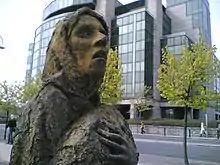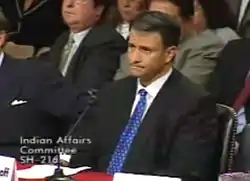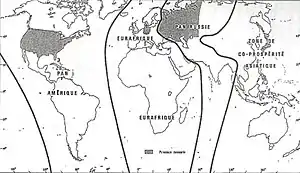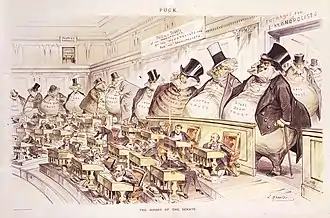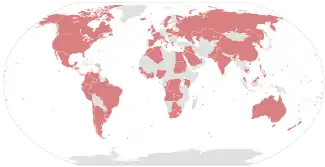| Main | Topics and categories | Tasks and projects |
The Politics portal
Politics (from Ancient Greek πολιτικά (politiká) 'affairs of the cities') is the set of activities that are associated with making decisions in groups, or other forms of power relations among individuals, such as the distribution of resources or status. The branch of social science that studies politics and government is referred to as political science.
It may be used positively in the context of a "political solution" which is compromising and nonviolent, or descriptively as "the art or science of government", but also often carries a negative connotation. The concept has been defined in various ways, and different approaches have fundamentally differing views on whether it should be used extensively or in a limited way, empirically or normatively, and on whether conflict or co-operation is more essential to it.
A variety of methods are deployed in politics, which include promoting one's own political views among people, negotiation with other political subjects, making laws, and exercising internal and external force, including warfare against adversaries. Politics is exercised on a wide range of social levels, from clans and tribes of traditional societies, through modern local governments, companies and institutions up to sovereign states, to the international level.
In modern nation states, people often form political parties to represent their ideas. Members of a party often agree to take the same position on many issues and agree to support the same changes to law and the same leaders. An election is usually a competition between different parties.
A political system is a framework which defines acceptable political methods within a society. The history of political thought can be traced back to early antiquity, with seminal works such as Plato's Republic, Aristotle's Politics, Confucius's political manuscripts and Chanakya's Arthashastra. (Full article...)
Selected article
The Han dynasty (202 BC – 220 AD) was the second imperial dynasty of China, following the Qin dynasty (221–207 BC). It was divided into the periods of Western (Former) Han (202 BC – 9 AD) and Eastern (Later) Han (25–220 AD), briefly interrupted by the Xin dynasty (9–23 AD) of Wang Mang. The capital of Western Han was Chang'an, and the capital of Eastern Han was Luoyang. The emperor headed the government, promulgating all written laws, serving as commander-in-chief of the armed forces, and presiding as the chief executive official. He appointed all government officials who earned a salary of 600 bushels of grain or more (though these salaries were largely paid in coin cash) with the help of advisors who reviewed each nominee. The empress dowager could either be the emperor's actual or symbolic mother, and was in practice more respected than the emperor, as she could override his decisions. The emperor's executive powers could also be practiced by any official upon whom he bestowed the Staff of Authority. These powers included the right to execute criminals without the imperial court's permission.
Featured picture
.jpg.webp)
David Ben-Gurion (born David Grün; 16 October 1886 – 1 December 1973) was the primary national founder of the State of Israel and the first Prime Minister of Israel. Adopting the name of Ben-Gurion in 1909, he rose to become the preeminent leader of the Jewish community in British-ruled Mandatory Palestine from 1935 until the establishment of the State of Israel in 1948, which he led until 1963 with a short break in 1954–55.
 Featured lists -
Featured lists -
Selected quote
Selected biography
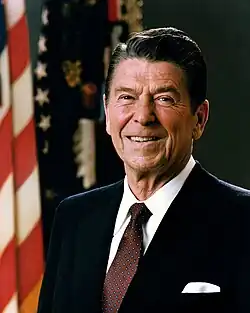
Ronald Reagan (1911–2004) was the 40th President of the United States and the 33rd Governor of California. He was defeated in his run for the Republican presidential nomination in 1968 as well as 1976, but won both the nomination and election in 1980. As U.S. President, Reagan implemented new political initiatives as well as economic policies, advocating a laissez-faire philosophy, but the extent to which these ideas were implemented is debatable. The policies, dubbed "Reaganomics", included substantial tax cuts implemented in 1981. After surviving an assassination attempt and ordering controversial military actions in Grenada, he was re-elected in a landslide victory in 1984. Reagan's second term was marked by the ending of the Cold War, as well as a number of administration scandals, notably the Iran–Contra affair. He ordered a massive military buildup in an arms race with the Soviet Union, foregoing the previous strategy of détente. He publicly portrayed the USSR as an "Evil Empire" and supported anti-Communist movements worldwide.
Did you know (auto-generated) -
- ... that Prawoto Mangkusasmito did not complete law school before the Japanese invaded because he was too busy with student and political organizations?
- ... that social projection may explain political polarization?
- ... that Mussolini is not interested in politics?
- ... that Angel Joy Chavis Rocker, a guidance counselor with no political experience, was the first black woman to run for President of the United States as a Republican?
- ... that Jonathan Allen left journalism for politics before quitting 40 days later?
- ... that Australian senator Ben Small had been a ship's officer, bar owner, paramedic, ambulance trainer, and logistician before entering politics?
More did you know...
- ...that the Communist League of America was formed after some members of the Communist Party USA were expelled for Trotskyism?
- ...that four member states of the European Union have de jure opt-outs and do not participate fully in all common policies?
- ...that Cornelius, Oregon is named after pioneer Thomas R. Cornelius, who served in the both the Territorial and State legislatures?
- ...that the Society of the Friends of Peasants had significant influence on the Danish Constitution of 1849?
- ...that the Brown Dog affair, an Edwardian era vivisection controversy, led to massive riots?
- ...that the Second Malaysia Plan sought to restructure the socioeconomic state of Malaysia through aggressive affirmative action?
In this month
- December 7, 2003 – the Conservative Party of Canada is formed.
- December 13, 2000 – The U.S. Supreme Court stops the Florida presidential recount, effectively giving the state, and the Presidency, to George W. Bush.
- December 6, 2005 – David Cameron becomes the 26th Leader of the British Conservative Party
- December 15, 2005 – Parliamentary elections are held in Iraq.
- December 17, 2005 – Evo Morales wins the presidential elections in Bolivia, ousting incumbent Eduardo Rodriguez and becoming the country's first indigenous leader.
- December 18, 1834 – Sir Robert Peel publishes the Tamworth Manifesto which lays the foundation for the modern British Conservative Party.
- December 30, 2006 – Former Iraqi dictator, Saddam Hussein is hanged.
News and Current events
- August 11: 4 local government areas in New South Wales, Australia locked down after COVID-19 case
- August 11: Australia: AstraZeneca vaccine access expanded by Victorian government
- August 1: Australia: Victorian lockdown lifted
- July 29: Tunisia's president dismisses prime minister, suspends parliament
- July 25: Australia: Wikinews interviews Reg Kidd, mayor of the City of Orange, about COVID-19 lockdown and local government
- July 23: South Australia enters week-long lockdown to contain COVID-19 Delta variant spread
- July 21: Technological University Dublin senior lecturer Dr Lorcan Sirr speaks to Wikinews on housing market in Ireland
- July 21: Three rural councils in New South Wales, Australia enter 7-day lockdown
- July 21: Australia: Victoria lockdown extended by a week with 85 active cases recorded
- July 15: California governor signs new state budget, eligible Californians to get stimulus payments
Topics and categories
General images
Related portals
Associated Wikimedia
The following Wikimedia Foundation sister projects provide more on this subject:
-
 Commons
Commons
Free media repository -
 Wikibooks
Wikibooks
Free textbooks and manuals -
 Wikidata
Wikidata
Free knowledge base -
 Wikinews
Wikinews
Free-content news -
 Wikiquote
Wikiquote
Collection of quotations -
 Wikisource
Wikisource
Free-content library -
 Wikiversity
Wikiversity
Free learning tools -
 Wiktionary
Wiktionary
Dictionary and thesaurus
Sources
More portals
-
 List of all portalsList of all portals
List of all portalsList of all portals -
 The arts portal
The arts portal -
 Biography portal
Biography portal -
 Current events portal
Current events portal -
 Geography portal
Geography portal -
 History portal
History portal -
 Mathematics portal
Mathematics portal -
 Science portal
Science portal -
 Society portal
Society portal -
 Technology portal
Technology portal -
 Random portalRandom portal
Random portalRandom portal -
 WikiProject PortalsWikiProject Portals
WikiProject PortalsWikiProject Portals
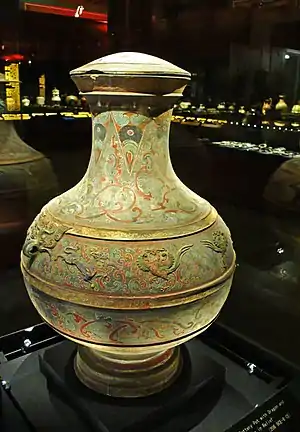

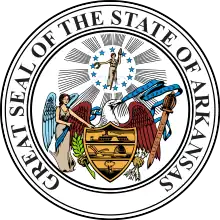
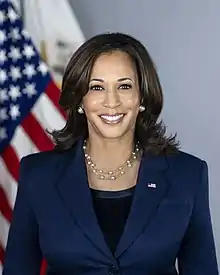
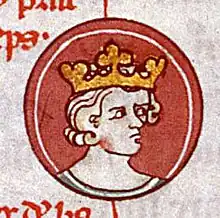
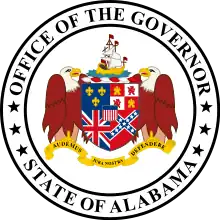
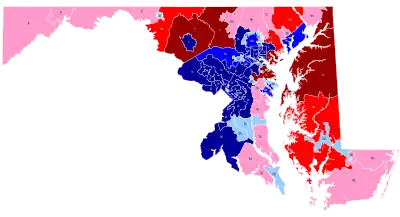
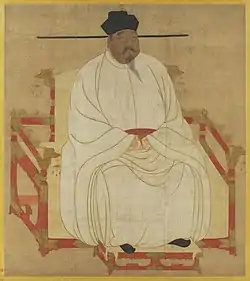
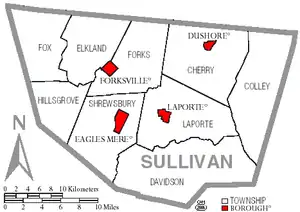

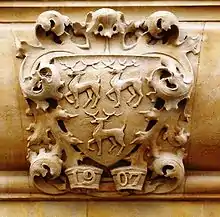
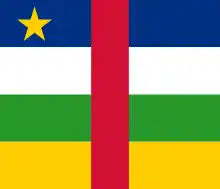
.jpg.webp)
.jpg.webp)
_(cropped).jpg.webp)

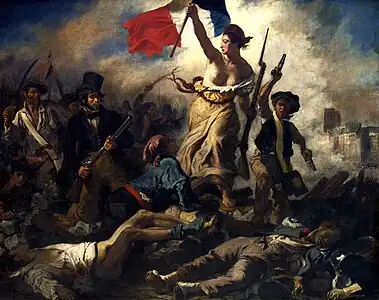
.svg.png.webp)
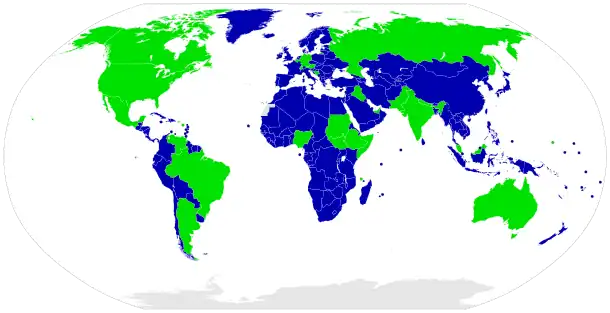
.jpeg.webp)
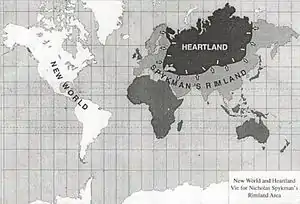
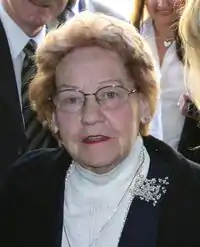
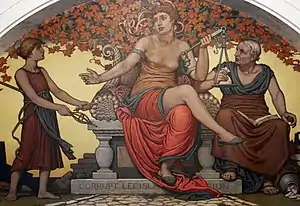
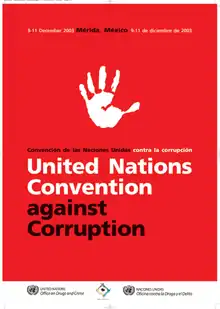
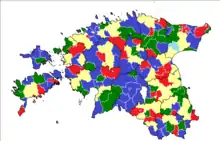
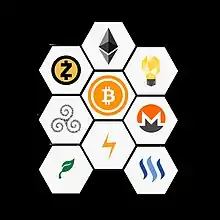
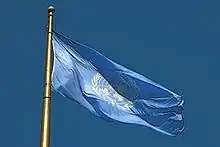
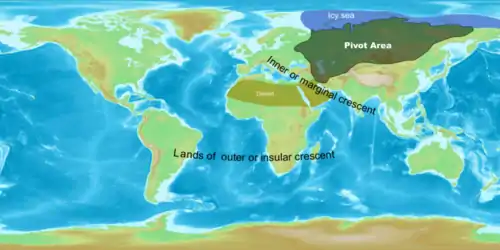
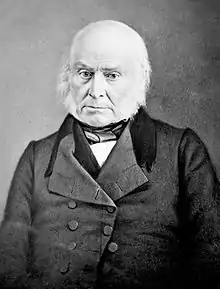
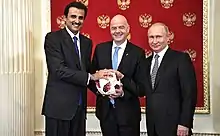
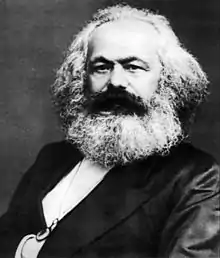
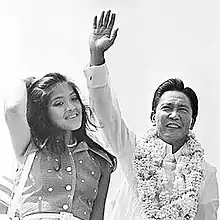
_(2).jpg.webp)
.jpg.webp)
